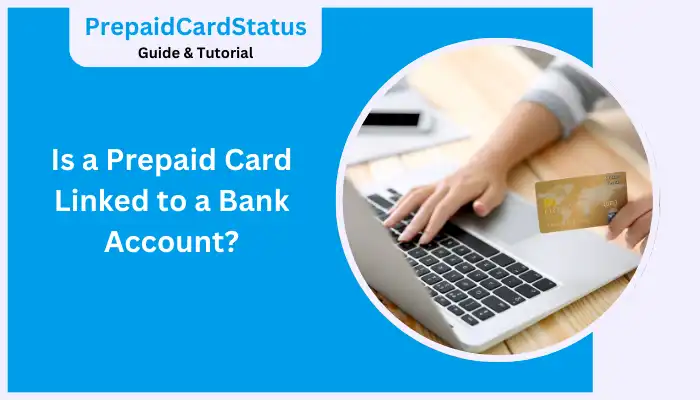Many users wonder “Is a prepaid card linked to a bank account?” the answer to this question varies depending on the type of prepaid card you are using.
While some prepaid cards operate independently, others are directly or indirectly tied to bank accounts. To check if your card is linked, you can review your PrepaidCardStatus login for account details.
In this blog, we’ll explore when prepaid cards are bank-linked, their benefits, drawbacks, and how they differ from non-bank-linked cards

Is a Prepaid Card Connected to a Bank Account?
The relationship between prepaid cards and bank accounts depends on how the card is issued, reloaded, and used. Let’s explore the two primary scenarios.
1. Prepaid Cards Without Bank Account Links
Many prepaid cards function independently of bank accounts. These include:
- Retail gift cards: Preloaded with a fixed amount and cannot be reloaded.
- Anonymous prepaid cards: No personal information or bank account is required.
- Disposable cards: Designed for one-time use with no account link.
Key Features:
- No bank details required for activation.
- Funds cannot be reloaded via a bank transfer.
- Typically used for short-term spending or gifting.
Example:
If you purchase a Visa gift card at a store, it functions like cash and is not linked to any bank account.
2. Prepaid Cards With Bank Account Links
Some prepaid cards are linked to bank accounts, allowing for:
- Direct deposit of wages.
- Bank-to-card fund transfers.
- Reloading through linked accounts.
Common Examples:
- Payroll cards: Employers deposit salaries directly onto the card.
- Bank-issued prepaid cards: Offered by banks as an alternative to checking accounts.
- Reloadable GPR cards: Allow users to transfer funds from their bank accounts.
3. How to Check If Your Prepaid Card Is Linked?
To determine if your prepaid card is linked to a bank account:
- Check the issuer: Cards from major banks are often linked.
- Review the reload options: If you can add funds via bank transfer, the card is likely linked.
- Check for direct deposit: If direct deposit is available, the card may be tied to a financial institution.
Understanding whether your prepaid card is linked to a bank account depends on its features and issuer—let’s break down difference between Bank-linked and non-bank linked prepaid cards.
Bank-Linked vs. Non-Bank-Linked Prepaid Cards:
To answer “Is a prepaid card linked to a bank account?”, it’s helpful to compare the features and functions of both types.
| Feature | Bank-Linked Prepaid Card | Non-Bank-Linked Prepaid Card |
|---|---|---|
| Reloading Options | Bank transfers, direct deposit, cash reload | Cash reload only |
| Usage | Payroll, travel, or regular spending | Gift or limited-use spending |
| Identity Verification | Requires ID and verification | Often anonymous |
| Security | FDIC insurance (if issued by a bank) | No bank protection |
| Long-term Usability | Can be used repeatedly | Often disposable |
As now we know what are the features of bank-linked and non-bank-linked prepaid cards , now let’s see some advantages.
Advantages of Bank-Linked Prepaid Cards
For consumers, prepaid cards linked to bank accounts offer several advantages:
For consumers, prepaid cards linked to bank accounts offer several advantages:
1. Convenient Reloading
Bank-linked prepaid cards allow:
- Direct deposits from employers.
- Easy fund transfers from your checking or savings account.
2. Increased Security
Prepaid cards linked to banks often come with:
- FDIC insurance, protects your funds.
- Fraud protection policies similar to debit cards.
3. Better Financial Management
Using a prepaid card linked to a bank account:
- Helps you track spending easily.
- Allows for automatic fund transfers.
- Offers online account management tools.
After knowing the advantages , now let’s discuss some disadvantages.
Drawbacks of Bank-Linked Prepaid Cards
While bank-linked prepaid cards offer benefits, they also have some drawbacks:
1. Fees and Charges
Prepaid cards often have:
- Reload fees when transferring funds from bank accounts.
- Monthly maintenance fees.
- ATM withdrawal fees, even with bank-linked cards.
2. Limited Features
Bank-linked prepaid cards may have:
- Spending limits, restricting how much you can spend.
- Limited ATM withdrawals or cash back options.
3. Privacy Concerns
Since linked prepaid cards require identity verification, they lack the anonymity of non-bank-linked prepaid cards.
So, linking prepaid cards have advantages but it even has some disadvantages, meanwhile It is crucial to know when to choose bank linked prepaid card.
When to Choose a Bank-Linked Prepaid Card?
Choosing a bank-linked prepaid card is ideal for:
- Choosing a bank-linked prepaid card is ideal for:
- Receiving wages or payments: If you don’t have a traditional checking account, a bank-linked prepaid card allows you to accept direct deposits.
- Frequent reloading needs: Bank-linked prepaid cards make it easy to add funds through transfers.
- Improved security: For regular use, a bank-linked prepaid card provides better protection through bank-backed insurance and fraud safeguards.
Now lets discuss about when to use non-bank-linked prepaid cards.
When to Use a Non-Bank-Linked Prepaid Card?
Non-bank-linked prepaid cards are better suited for:
- One-time spending: Gift cards or disposable prepaid cards are ideal for short-term use.
- Privacy concerns: Since they don’t require personal information, they offer more anonymity.
- Travel or emergency expenses: Non-linked prepaid cards can be used without exposing bank details.
now lets wrap the answer to the main question “is a prepaid card linked to bank account?”.
Conclusion
So, is a prepaid card linked to a bank account? The answer depends on the card type. Some prepaid cards, such as payroll or reloadable GPR cards, are linked to bank accounts, offering added convenience and security.
Others, like retail gift cards and disposable prepaid cards, are not linked and function independently. For consumers, understanding whether their prepaid card is linked to a bank account is essential for managing funds effectively, choosing the right card type for their needs, and ensuring proper security when using prepaid cards.
When selecting a prepaid card, consider whether you need the convenience of a bank-linked card or the anonymity and simplicity of a non-linked one.
